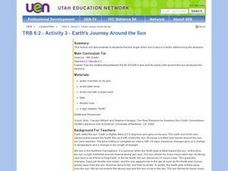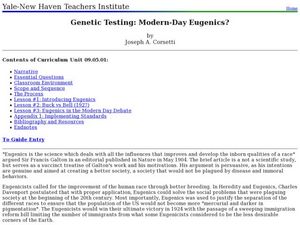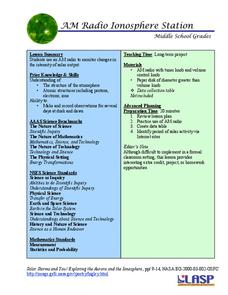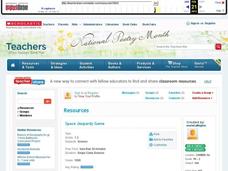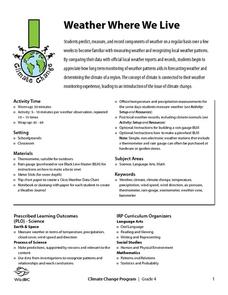Curated OER
Day 4: Plate Tectonics II
Pupils explore the theory of plate tectonics. In this geology lesson plan, students conduct a simulation of the crust of the Earth floating on the mantle. Pupils research plate tectonics and share their findings with the class. Students...
Curated OER
Day and Night
Students using experiments try to demonstrate how observations can be affected by the cycles of night and day.
Curated OER
Exploration of the Moon
In this moon worksheet, students will use a table with facts about the moon to answer questions about the moon's rotation, distance from the Earth, gravity, and temperature. Students will complete 9 short answer questions.
Curated OER
Earth's Journey Around the Sun
Sixth graders examine how the angle of the sun's rays is a factor in determining the seasons. They watch a teacher demonstration of the concepts and write a paragraph demonstrating their understanding.
Curated OER
Rocks and Their Properties: Day 5
Students demonstrate their knowledge of rock formation processes in varied ways by sharing their cooperative research projects with the class. They generate well-framed questions in response to each presentation.
Curated OER
Rock and Their Properties: Days 2-4
Students engage in cooperative research projects in order to study about the properties of the three basic rock types and the processes that form them. They plan and develop their products.with the resources for conducting their...
Curated OER
Solar Car Series: During what part of the day can t most Sun power be collected?
Students participate in an outdoor activity in which they make direct but safe observations of the Sun. Students use a solar cell and voltmeter apparatus to collect data on the amount of DC voltage produced by the solar cell during a...
Curated OER
Space Shuttle Science
Learners study the nomenclature, operation and purpose of America's Space Transportation system. They demonstrate how water can be broken down into its component gases of hydrogen and oxygen by electrolysis. They construct and use the...
Curated OER
Earth: The Food We Eat, The Seeds We Sow
Students explore the importance of seed diversity for cultural and ecological stability/health. They discover what an heirloom seed is and why they are important to conserve.
Curated OER
Measuring the Earth (Eratoshenes' method)
Sixth graders engage in problem solving, communicating, reasoning, and connecting to represent and solve problems, using geometric models.
Curated OER
Earth: Land Use Picture Project
Students explore how changes in human land use are impacting local environments. They also explore some of the social impacts of various land uses in their area. They identify and discuss some social impacts of the different land uses.
Curated OER
A Day In My Life
Students brainstorm how they can conserve energy in their daily lives. In this energy lesson plan, students discuss how they use energy and ways to conserve it.
Curated OER
Genetic Testing: Modern-Day Eugenics?
Students trace the history of the development of Eugenics. In this social studies activity, students read and analyze a real life case. They write a paper about what they read.
Curated OER
ABCs of Endangered Species
Students create an ABC Book of Endangered Animals that includes locator maps, "fast facts," and explanations about why those animals are endangered.
Curated OER
28 Days - The Lunar Cycle time line
Third graders create a labeled lunar diagram time line illustrating the lunar cycle using Internet resources. An assigned date/month is given to each student, and an online Moon Phase calculator assists them with their drawings.
Curated OER
Sorting Recyclables
In this sorting recyclables worksheet, learners examine the 18 pictured items, cut them out, and paste them on top of the appropriate recycling bins.
Curated OER
Integrating Environmental Science-Ozone Depletion
In this ozone worksheet, students read about the ozone layer, its make-up and its depletion. They answer three critical thinking questions about ozone and the ozone layer.
Columbus City Schools
Experiencing Eclipses
Don't be caught in the dark! Young scientists investigate the causes of both solar and lunar eclipses using an interactive to help them understand the development of an eclipse over time. They then research facts and characteristics...
University of Colorado
The Jovian System: A Scale Model
Jupiter has 67 moons! As the seventh in a series of 22, the exercise shows learners the size and scale of Jupiter and its Galilean moons through a model. They then arrange the model to show how probes orbited and gathered data.
Curated OER
The Potential Consequences of Climate Variability and Change
Students analyze the impact of climate variability and change utilizing a broad span of topics over a wide range of grade levels. This three lesson unit is easily adapted for the various instructional levels listed.
Space Awareness
Measure the Solar Diameter
Scientists could measure the diameter of the sun before they knew its distance. Scholars construct a simple mirror box to measure the diameter for themselves. They compare this measurement with the official size, listed in a...
PHET
AM Radio Ionosphere Station
Tune in! Young scientists use an AM radio at home to monitor solar output. The long-term project would be ideal in a flipped classroom or as an out-of-class project.
Curated OER
Space Jeopardy Game
Students explore space. In this space lesson, students analyze the sky and what causes its changes. Students describe the moon patterns and use a model to show changes in its shape. Students also describe the first trip to the moon....
Wild BC
Weather Where We Live
Over a span of two weeks or more, mini meteorologists record weather-related measurements. What makes this particular resource different from others covering similar activities are the thorough details for the teacher and printables for...
Other popular searches
- Science Earth Day Activities
- Science Earth Day Lessons
- Earth Day Science
- Earth Day Science Projects
- Earth Day Science Lesson Plans





